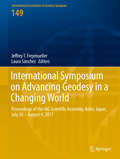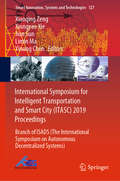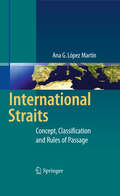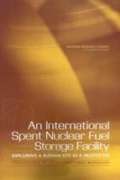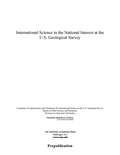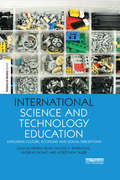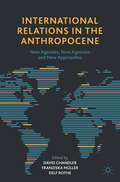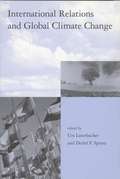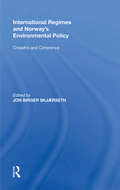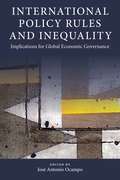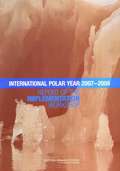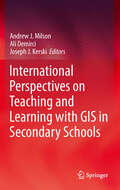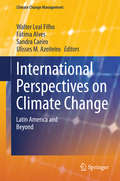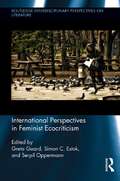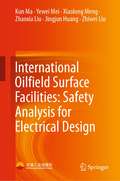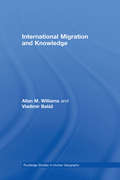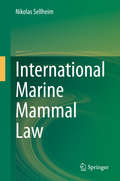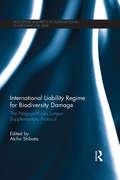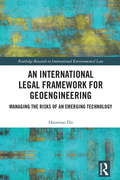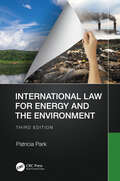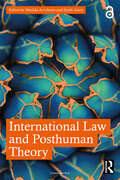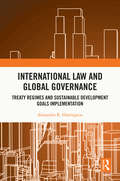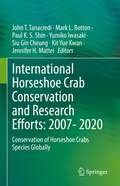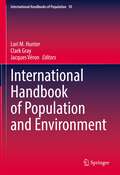- Table View
- List View
International Symposium on Advancing Geodesy in a Changing World: Proceedings of the IAG Scientific Assembly, Kobe, Japan, July 30 – August 4, 2017 (International Association of Geodesy Symposia #149)
by Jeffrey T. Freymueller Laura SánchezThese proceedings contain 23 papers, which are the peer-reviewed versions of presentations made at the Joint Scientific Assembly of the International Association of Geodesy (IAG) and the International Association of Seismology and Physics of the Earth’s Interior (IASPEI). The assembly was held from 30 July to 4 August 2017 in Kobe, Japan. The scientific assembly included seven symposia organized by IAG, and nine joint symposia, along with additional symposia organized by IASPEI. The IAG symposia were structured according to the four IAG Commissions and the three GGOS Focus Areas, and included reference frames, static and time-variable gravity field, Earth rotation and geodynamics, multi-signal positioning, geodetic remote sensing, and GGOS. The joint symposia included monitoring of the cryosphere, studies of earthquakes, earthquake source processes, and other types of fault slip, geohazard warning systems, deformation of the lithosphere, and seafloor geodesy. Together, the IAG and joint symposia spanned a broad range of work in geodesy and its applications.
International Symposium for Intelligent Transportation and Smart City: Branch of ISADS (The International Symposium on Autonomous Decentralized Systems) (Smart Innovation, Systems and Technologies #127)
by Xiaoqing Zeng Xiongyao Xie Jian Sun Limin Ma Yinong ChenThis book presents research advances in intelligent transportation and smart cities in detail, mainly focusing on green traffic and urban utility tunnels, presented at the 4th International Symposium for Intelligent Transportation and Smart City (ITASC) held at Tongji University, Shanghai, on May 8–10, 2019. It discusses a number of hot topics, such as the 2BMW system (Bus, Bike, Metro and Walking), transportation safety and environmental protection, urban utility design and application, as well as the application of BIM (Building Information Modeling) in city design. By connecting the theory and applications of intelligent transportation in smart cities, it enhances traffic efficiency and quality. The book gathers numerous selected papers and lectures, including contributions from respected scholars and the latest engineering advances, to provide guidance to researchers in the field of transportation and urban planning at universities and in related industries.The first conference in the ITASC series was held in 2013 as a workshop of the International Symposium on Autonomous Decentralized System (ISADS) in Mexico City. The second and third were held in May 2015 and May 2017, respectively, in Tongji University, Shanghai.
International Straits
by Ana G. López MartínThis book analyzes the regime of navigation in historical relation to the United Nations Convention of the Law of Sea (UNCLOS) of 10 December 1982, and then analyzes in detail the concept of international straits to arrive at a complete definition. This work examines the eight categories of straits laid out in the UNCLOS. It analyzes the right of innocent passage and the regime of transit passage, both systems of navigation in international straits, and then presents the domestic legislation and the traffic separation schemes which apply to international straits. Finally, the work includes a complete catalogue of straits with the reference to their respective UNCLOS articles.
An International Spent Nuclear Fuel Storage Facility: EXPLORING A RUSSIAN SITE AS A PROTOTYPE
by National Research Council of the National AcademiesAs part of a long-standing collaboration on nuclear nonproliferation, the National Academy of Sciences and the Russian Academy of Sciences held a joint workshop in Moscow in 2003 on the scientific aspects of an international radioactive disposal site in Russia. The passage of Russian laws permitting the importation and storage of high-level radioactive material (primarily spent nuclear fuel from reactors) has engendered interest from a number of foreign governments, including the U.S., in exploring the possibility of transferring material to Russia on a temporary or permanent basis. The workshop focused on the environmental aspects of the general location and characteristics of a possible storage site, transportation to and within the site, containers for transportation and storage, inventory and accountability, audits and inspections, and handling technologies.
International Science in the National Interest at the U.S. Geological Survey
by National Research Council Division on Earth and Life Studies Board on Earth Sciences and Resources Committee on Opportunities and Challenges for International Science at the U.S. Geological SurveyScience at the U.S. Geological Survey (USGS) is intrinsically global, and from early in its history, the USGS has successfully carried out international projects that serve U.S. national interests and benefit the USGS domestic mission. Opportunities abound for the USGS to strategically pursue international science in the next 5-10 years that bears on growing worldwide problems having direct impact on the United States--climate and ecosystem changes, natural disasters, the spread of invasive species, and diminishing natural resources, to name a few. Taking a more coherent, proactive agency approach to international science--and building support for international projects currently in progress-would help the USGS participate in international science activities more effectively.
International Science and Technology Education: Exploring Culture, Economy and Social Perceptions (The Earthscan Science in Society Series)
by Ortwin Renn Nicole C. Karafyllis Andreas Hohlt Dorothea TaubeEducation in science, technology, engineering and mathematics (STEM) is crucial for taking advantage of the prospects of new scientific discoveries initiating or promoting technological changes, and managing opportunities and risks associated with innovations. This book explores the emerging perspectives and methodologies of STEM education and its relationship to the cultural understanding of science and technology in an international context. The authors provide a unique perspective on the subject, presenting materials and experiences from non-European industrialized as well as industrializing countries, including China, Japan, South Korea, India, Egypt, Brazil and the USA. The chapters offer a wide scope of interpretations and comparative reviews of STEM education by including narrative elements about cultural developments, considering the influence of culture and social perceptions on technological and social change, and applying innovative tools of qualitative social research. The book represents a comprehensive and multidisciplinary review of the current status and future challenges facing STEM education across the world, including issues such as globalization, interdependencies of norms and values, effects on equity and social justice as well as resilience. Overall the volume provides valuable insights for a broad and comprehensive international comparison of STEM philosophies, approaches and experiences.
International Relations in the Anthropocene: New Agendas, New Agencies and New Approaches
by David Chandler Delf Rothe Franziska MüllerThis textbook introduces advanced students of International Relations (and beyond) to the ways in which the advent of, and reflections on, the Anthropocene impact on the study of global politics and the disciplinary foundations of IR. The book contains 24 chapters, authored by senior academics as well as early career scholars, and is divided into four parts, detailing, respectively, why the Anthropocene is of importance to IR, challenges to traditional approaches to security, the question of governance and agency in the Anthropocene, and new methods and approaches, going beyond the human/nature divide.
International Relations and Global Climate Change
by Urs Luterbacher Detlef F. SprinzThis book surveys current conceptual, theoretical, and methodological approaches to global climate change and international relations. Although it focuses on the role of states, it also examines the role of nonstate actors and international organizations.
International Regimes and Norway's Environmental Policy: Crossfire and Coherence
by Jon Birger Skj�ethSince the former Norwegian prime minister, Gro Harlem Brundtland, led the World Commission on Sustainable Development, Norway has played an important role in international environmental co-operation. This volume looks at how this one state engaged international regimes in order to pursue its own national goals in the following issue areas: climate change, biodiversity, ozone depletion, air pollution, marine pollution and whaling. In doing so, it offers an innovative new approach to the study of international regime effectiveness and on linkages or interactions between international regimes.
International Policy Rules and Inequality: Implications for Global Economic Governance (Initiative for Policy Dialogue at Columbia: Challenges in Development and Globalization)
by José Antonio OcampoOver the past decades, the world has seen a dramatic increase in inequality. To what extent have the rules that govern the global economy, formally or informally, affected this trend? How can global governance arrangements be reformed to counteract them?In this book, an interdisciplinary group of prominent scholars scrutinizes how the rules of global economic governance—or the lack thereof—determine the extent and growth of inequality. Economists, political scientists, lawyers, and other experienced contributors bring together cutting-edge research on global rule making and inequality, exploring how international rules can exacerbate inequalities among and within countries to show the crucial interactions between policy choices and the distribution of income and wealth. They provide an in-depth examination of the rules governing foreign-investment protection, cross-border financial flows, and intellectual property rights, as well as the lack of standards governing international taxation and the channels through which they might affect inequality. With a focus on ambitious and achievable reforms, this book offers concrete steps toward global economic governance capable of counteracting inequitable wealth distribution and bringing about fairer economic growth.
International Polar Year 2007-2008: Report Of The Implementation Workshop
by Polar Research BoardThe National Academies Press (NAP)--publisher for the National Academies--publishes more than 200 books a year offering the most authoritative views, definitive information, and groundbreaking recommendations on a wide range of topics in science, engineering, and health. Our books are unique in that they are authored by the nation's leading experts in every scientific field.
International Perspectives on Teaching and Learning with GIS in Secondary Schools
by Joseph J. Kerski Andrew J. Milson Ali DemirciThis, the first publication to collate a broad international perspective on the pedagogical value of GIS technology in classrooms, offers an unprecedented range of expert views on the subject. Geographic Information Systems (GISs) are now ubiquitous and relatively inexpensive. They have revolutionized the way people explore and understand the world around them. The capability they confer allows us to capture, manage, analyze, and display geographic data in ways that were undreamt of a generation ago. GIS has enabled users to make decisions and solve problems as diverse as designing bus routes, locating new businesses, responding to emergencies, and researching climate change. GIS is also having a major impact in the classroom. Students and teachers around the world are using this significant emerging technology in the secondary school classroom to study social and scientific concepts and processes, to broaden their technical skills, and to engage in problem solving and decision making about local and global issues. International Perspectives on Teaching and Learning with GIS in Secondary Schools brings together authors from 34 countries who profile the current status of GIS in secondary school teaching and learning in their country. Each chapter includes a summary of the country's educational context, a case study illustrating how GIS is used in secondary schooling, and an assessment of the opportunities and challenges in teaching and learning with GIS now and in the future. The book demonstrates that GIS is not only a technological tool to be used in the classroom, but also a catalyst for motivation, encouragement, and cooperation in understanding and solving global problems. The most up to date and extensive survey of GIS in the secondary education landscape, covering both principles and practice. Professor David Maguire, Pro-Vice-Chancellor, Birmingham City University, UK International Perspectives on Teaching and Learning With GIS in Secondary Schools is a highly relevant, critically important, reflective contribution to the literature, providing strong arguments supporting the inclusion for spatial studies for all in secondary school education. Karl Donert, President, EUROGEO This is an invaluable and inspirational examination of innovation in geospatial technologies in secondary schools around the world. Each chapter contains practical models for how to integrate powerful tools for spatial analysis into a range of subjects. It will be useful to classroom teachers and administrators seeking pathways to implementation and teacher educators considering how to prepare the next generation to use geospatial technologies. Sarah Witham Bednarz, Department of Geography, Texas A&M University, College Station, TX, USA
International Perspectives on Climate Change
by Walter Leal Filho Fátima Alves Sandra Caeiro Ulisses M. AzeiteiroThis collected volume deals with emerging issues related to climate variation, climate change and adaptation technologies, with a special focus on Latin American countries. Presenting a variety of adaptation strategies and projects currently being undertaken and implemented, the book showcases how Latin American nations are struggling to meet the challenges of climate change. Latin America as a whole and Central America in particular is one of the most vulnerable regions of the world and is severely affected by recurrent extreme climate-related events. This volume documents and analyzes the main challenges and lessons learned, serving to disseminate knowledge beyond the region and enhance international research and policy cooperation.
International Perspectives in Feminist Ecocriticism (Routledge Interdisciplinary Perspectives on Literature #16)
by Serpil Oppermann Simon C. Estok Greta GaardExploring environmental literature from a feminist perspective, this volume presents a diversity of feminist ecocritical approaches to affirm the continuing contributions, relevance, and necessity of a feminist perspective in environmental literature, culture, and science. Feminist ecocriticism has a substantial history, with roots in second- and third-wave feminist literary criticism, women’s environmental writing and social change activisms, and eco-cultural critique, and yet both feminist and ecofeminist literary perspectives have been marginalized. The essays in this collection build on the belief that the repertoire of violence (conceptual and literal) toward nature and women comprising our daily lives must become central to our ecocritical discussions, and that basic literacy in theories about ethics are fundamental to these discussions. The book offers an international collection of scholarship that includes ecocritical theory, literary criticism, and ecocultural analyses, bringing a diversity of perspectives in terms of gender, sexuality, and race. Reconnecting with the histories of feminist and ecofeminist literary criticism, and utilizing new developments in postcolonial ecocriticism, animal studies, queer theory, feminist and gender studies, cross-cultural and international ecocriticism, this timely volume develops a continuing and international feminist ecocritical perspective on literature, language, and culture.
International Oilfield Surface Facilities: Safety Analysis for Electrical Design
by Kun Ma Yewei Mei Xiaolong Meng Zhaoxia Liu Jingjun Huang Zhiwei LiuThis book mainly introduces an essential safety concept and procedure for electrical engineering in oil and gas field. It begins by providing broad guidelines for performing electrical safety and operability review (ELSOR), giving reader a general overview of the field. It subsequently verifies electrical distribution, overhead line and hazardous area classification safety analysis together with comparison of different international codes and standards with China national codes, to interpret different safety concepts from different countries for electrical engineering in oil and gas field. This unique and complete co-design safety analysis will greatly benefit international electrical engineers and operators of oil and gas fields. This book is with vivid flow chart, accurate table expressing the analysis logic method and exact illustrations of code and standard of different country and area. This book stresses the electrical design safety for surface facilities of oil and gas oil field and will benefit to engineer who works with oil and gas field surface facilities engineering.
International Migration and Knowledge (Routledge Studies in Human Geography)
by Allan Williams Vladimir BalážTwo unconnected but important recent academic and policy debates have focussed on the idea of the knowledge-based economy and the economic consequences of increasing international migration. This book challenges pre-conceived views on the debates and argues the need to understand that all migrants are potentially knowledge carriers and learners, and that they play an essential role in the globalization of knowledge transactions. Deconstructing the concept of knowledge, and demonstrating how tacit knowledge is in fact an amalgam of encultured and embrained/embodied forms of knowledge this book considers how international migration has profound consequences, analysed, first, in terms of the economic and immigration strategies of national and regional bodies. And, secondly, the authors explore how the ‘diversity dividend’ of migration is captured by firms through their management strategies, and by individuals through increasingly boundaryless careers, continuous learning and transnational working lives. This research is a highly original contribution which provides the first overview of one of the most dynamic forces for change in the globalising economy. It will challenge migration researchers and students to engage with the management and learning literatures, and it will challenge management and economic policy analysts to think through the role of international migration. As such it will contribute to teaching and research in a range of social science disciplines, as well as to those involved in policy arenas ensuring that firms and all migrants engage in mutual learning and knowledge sharing.
International Marine Mammal Law
by Nikolas SellheimInternational Marine Mammal Law is a comprehensive, introductory volume on the legal regimes governing the conservation and utilisation of marine mammals. Written as a textbook, it provides basic overviews of international conservation law, which enable the reader to understand the greater implications of governance of a specific group of species. Paired with biological information on some marine mammal species, the international regimes for whales, seals and polar bears are explored — either as part of global regimes of international environmental governance or as regimes that were specifically designed for them. The book concludes with outlooks on the future of international marine mammal law, particularly in light of Japan’s withdrawal from the International Convention for the Regulation of Whaling in July 2019.
International Liability Regime for Biodiversity Damage: The Nagoya-Kuala Lumpur Supplementary Protocol (Routledge Research in International Environmental Law)
by Akiho ShibataThe Nagoya-Kuala Lumpur Supplementary Protocol on Liability and Redress to the Cartagena Protocol on Biosafety, adopted on 15 October 2010 in Nagoya, Japan, provides an international liability regime for biodiversity damage caused by living modified organisms (LMOs). Its adoption marks a significant development in the legal design for international environmental liability regimes, as it incorporates for the first time in global treaties an administrative approach to liability. This book examines the Supplementary Protocol from both practitioner and academic perspectives. In its three parts the book explores the historical development, legal significances, and future implementation of the core provisions of the Supplementary Protocol, focusing specifically on its incorporation of an administrative approach to liability for biodiversity damage and its relation to civil liability. Contributors to the volume include Co-Chairs of the negotiating group and the negotiators and advisors from some of the key negotiating Parties, offering valuable insights into the difficult-to-read provisions of the Supplementary Protocol. The book demonstrates the significant changes in the political configuration of environmental treaty negotiations which have come about in the twenty-first century, and argues that the liability approach of the Supplementary Protocol has important implications for future development of international liability regimes under international environmental law.
An International Legal Framework for Geoengineering: Managing the Risks of an Emerging Technology (Routledge Research in International Environmental Law)
by Haomiao DuGeoengineering provides new possibilities for humans to deal with dangerous climate change and its effects but at the same time creates new risks to the planet. This book responds to the challenges geoengineering poses to International Law by identifying and developing the rules and principles that are aimed at controlling the risks to the environment and human health arising from geoengineering activities, without neglecting the contribution that geoengineering could make in preventing dangerous climate change and its impacts. It argues first that the employment of geoengineering should not cause significant environmental harm to the areas beyond the jurisdiction of the state of origin or the global commons, and the risk of causing such harm should be minimized or controlled. Second, the potential of geoengineering in contributing to preventing dangerous climate change should not be downplayed.
International Law in a Transcivilizational World
by Onuma YasuakiThe twenty-first century will witness conflicts which may destabilize the international order. These conflicts are likely to arise between emerging Asian States such as China and India whose material power is growing, and the Western nations who wield significant ideational power. A West-centric international society will change to a multi-polar and multi-civilizational global society. This structural change includes, and further needs, changes of understandings and perceptions of the world, including of international law. The perspectives from which we see, understand, appreciate and assess international law must change. We need to interpret international law not only from a prevalent Statecentric international perspective and West-centric transnational perspective. Onuma argues that we must grasp international law from what he calls a trans-civilizational perspective as well. By adopting such three-layered perspectives, international law is shown to be functioning as a tool of politics yet constrained by cultural and civilizational factors. Such complex subjects as global history of international law, concepts of general and customary international law, and human rights could be appreciated in a more nuanced and subtle manner.
International Law for Energy and the Environment
by Patricia ParkThis revised edition of Energy Law and the Environment considers how international and national legislation now requires the energy sector to focus more on sustainability and the circular economy in response to new policies at both international and national levels. It explores how environmental law engages with multinational companies regarding energy sources, ownership of those resources, and state sovereignty. Written for all the players in the energy sector, lawyers and non-lawyers alike, this third edition considers the issues of energy sector regulation related to economics and protection of intellectual property associated with the development of technologies for mitigating environmentally damaging emissions. It has been updated throughout and adds new and fully revised chapters on subjects, including climate change, human rights, renewable energy, and energy law in China. Features: Updated throughout and adds new and fully revised chapters Focuses on the global trends and mandates towards environmental sustainability Examines the latest international legislation involving climate change Includes the coverage of oil and gas industries, as well as nuclear and renewable energy
International Law and Posthuman Theory
by Matilda Arvidsson Emily JonesAssembling a series of voices from across the field, this book demonstrates how posthuman theory can be employed to better understand and tackle some of the challenges faced by contemporary international law.With the vast environmental devastation being caused by climate change, the increasing use of artificial intelligence by international legal actors and the need for international law to face up to its colonial past, international law needs to change. But in regulating and preserving a stable global order in which states act as its main subjects, the traditional sources of international law – international legal statutes, customary international law, historical precedents and general principles of law – create a framework that slows down its capacity to act on contemporary challenges, and to imagine futures yet to come. In response, this collection maintains that posthuman theory can be used to better address the challenges faced by contemporary international law. Covering a wide array of contemporary topics – including environmental law, the law of the sea, colonialism, human rights, conflict and the impact of science and technology – it is the first book to bring new and emerging research on posthuman theory and international law together into one volume.This book’s posthuman engagement with central international legal debates, prefaced by the leading scholar in the field of posthuman theory, provides a perfect resource for students and scholars in international law, as well as critical and socio-legal theorists and others with interests in posthuman thought, technology, colonialism and ecology.Chapters 1, 9 and 11 of this book is freely available as a downloadable Open Access PDF at http://www.taylorfrancis.com under a Creative Commons Attribution-Non Commercial-No Derivatives (CC-BY-NC-ND) 4.0 license.
International Law and Global Governance: Treaty Regimes and Sustainable Development Goals Implementation
by Alexandra R. HarringtonThis book explores the methods through which international law and its associated innovative global governance mechanisms can strengthen, foster and scale up the impacts of treaty regimes and international law on the ability to implement global governance mechanisms. Examining these questions through the lens of the Sustainable Development Goals (SDGs), the book looks at environmental, social and economic treaty regimes. It analyses legal methodologies as well as comparative methods of assessing the relationship between the SDGs and treaty regimes and international law. Contradictions exist between international treaty regimes and principles of international law resulting in conflicting implementation of the treaty regimes and of global governance mechanisms. Without determining these areas of contest and highlighting their detrimental impacts, the SDGs and other efforts at global governance cannot maximize their legal and societal benefits. The book concludes by suggesting a path forward for the SDGs and for international treaty regimes that is forged in a solid understanding and application of the advantages of global governance mechanisms, including reflections from the COVID-19 pandemic experience. Addressing the strengths, gaps and weaknesses related to treaty regimes and global governance mechanisms, the book provides readers with a comprehensive understanding of this increasingly important topic. It will be of interest to students, researchers and practitioners with an interest in sustainability and law.
International Horseshoe Crab Conservation and Research Efforts: Conservation of Horseshoe Crabs Species Globally
by John T. Tanacredi Mark L. Botton Paul K. S. Shin Yumiko Iwasaki Siu Gin Cheung Kit Yue Kwan Jennifer H. MatteiThe first International Conference on Horseshoe Crab’s Conservation conducted at Dowling College, USA, (2007) and it’s proceedings published by Springer in 2009, prompted the continued research and conservation efforts presented at subsequent conferences and colloquium in Hong Kong, Taiwan, (2011); San Diego, CA, (2014), (CERF); Japan, Sasebo (2015) and an accepted inclusion for a special session on Horseshoe Crabs at the 2017 CERF Conference held in Providence, RI, USA. All these aforementioned conferences contributed manuscripts, posters, workshop “position papers”, and oral presentations the majority of which have not been published in total. In 2015, Carmichael et al. had published by Springer the majority of manuscripts from the 2011 Hong Kong / Taiwan conference. However, workshop results and all subsequent presentations and workshops were not. The Japan conference presented over 40 papers alone. A collection of all workshop summaries, poster presentations and new manuscript submittals (San Diego, CA; Sasebo, Japan; and Providence, RI) as well as products prepared for the IUCN World Congress in Hawaii, (2016), are included potential contributions for review in this compilation now available for global distribution in this Springer Nature publication.The “Proceedings of International Conferences on the Biology and Conservation of Horseshoe Crabs”, thus contains over 50 manuscripts and a diversified collection of documents, photos and memorabilia covering all four of the horseshoe crab species globally: their biology, ecology evolution, educational, and societal importance. This book exposes the impacts that humans have imposed on all four of these species, revealing through the coordinated effort of horseshoe crab scientists with the IUCN, of the worldwide need for a clear conservative effort to protect these paleo- survival organisms from a looming extinction event. Biologists, conservationists, educators, and health professionals will all welcome this book not only for exploration of its pharmacological interest, but also for the mystery of their longevity. This book also clarifies the future research needs and the conservation agenda for the species worldwide. Anyone working or studying estuaries on a global scale, will need to obtain this seminal work on horseshoe crabs.
International Handbook of Population and Environment (International Handbooks of Population #10)
by Jacques Véron Lori M. Hunter Clark GrayThis handbook presents a timely and comprehensive overview of theory, data, methods and research findings that connect human population dynamics and environmental context. It presents regional summaries of empirical findings on migration and environmental connections and summarizes environmental impacts of migration – such as urbanization and deforestation. It also offers background on the health implications of environmental conditions such as climate change, natural disasters, scarcity of natural resources, as well as on resource scarcity and fertility, gender considerations in population and environment, and the connections between population size, growth, composition and carbon emissions. This handbook helps readers to better understand the complexities within population-environment connections, in addition to some of the opportunities and challenges within environmental demography. As such this collection is an invaluable resource for students, researchers, and policy analysts in the areas of demography, migration, fertility, health and mortality, as well as environmental, global and development studies.
